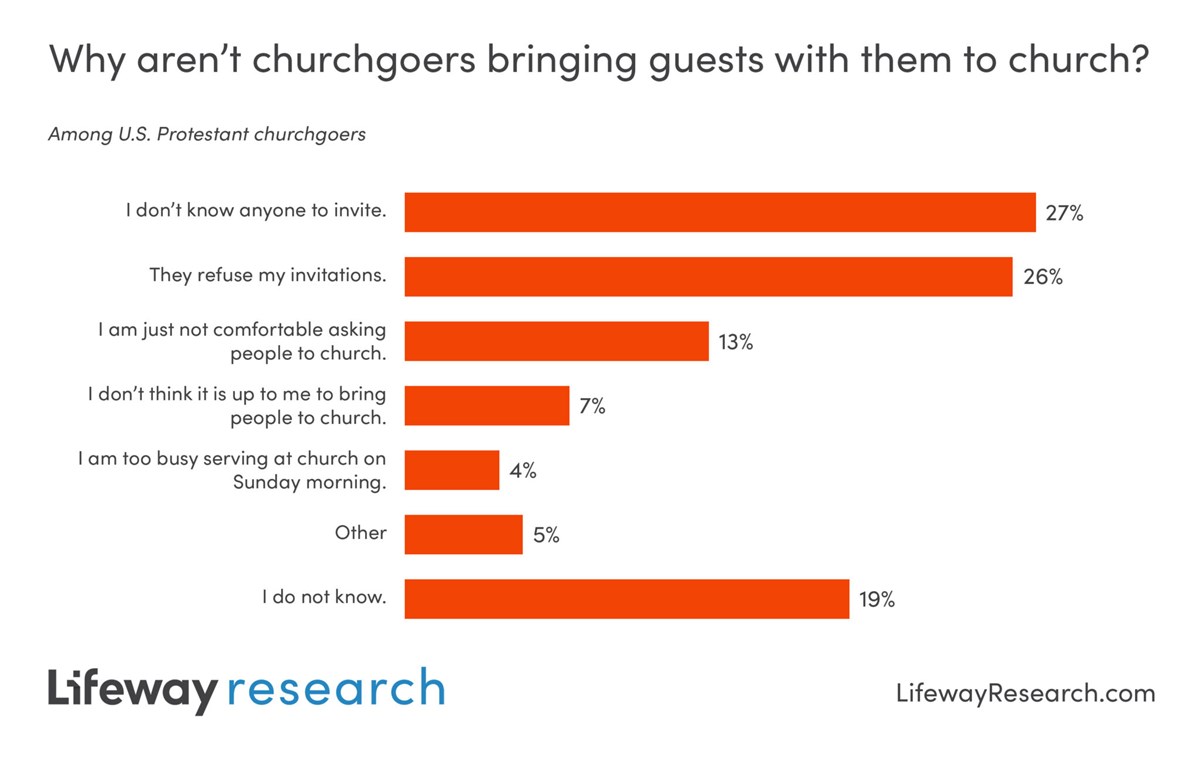When churchgoers show as much as their church’s worship service, they’re often hoping to have a guest with them.
A Lifeway Research study of US Protestant churchgoers finds 3 in 5 (60%) say they’ve prolonged at the least one invitation up to now six months for somebody to attend their church, including 19 percent who’ve made one invitation, 21 percent with two invitations and 20 percent with three or more invitations.
A 3rd of churchgoers say they haven’t invited anyone to a worship service at their church up to now six months, while 7 percent say they aren’t sure what number of invitations they’ve made.
“Churchgoers weren’t asked the standard net promoter rating query of whether or not they recommend their church. They were asked in the event that they’ve actually invited someone within the last six months,” said Scott McConnell, executive director of Lifeway Research. “For most churchgoers, invitations should not just an aspiration but a current practice.”
Extending invites
Compared to a similar Lifeway Research study six years ago, the same percentage of churchgoers say they haven’t invited anyone recently—33 percent now versus 29 percent in 2017. Fewer churchgoers, nonetheless, are making three or more invitations. In 2017, 1 in 4 said they’d prolonged at the least three invitations for somebody to go to their church within the previous six months. Currently, 20 percent say the identical.
“It’s not surprising the proportion of churchgoers extending invites shouldn’t be growing, for the reason that proactive nature of inviting people to church is counter-cultural,” said McConnell. “People in America should not being more relational, but an invite to church is an invite to affix you in activities you enjoy, a message that brings you hope, and relationships with you and others.”
Some churchgoers usually tend to invite guests than others. Unsurprisingly, those that attend more often usually tend to extend invitations. Churchgoers who attend 4 times a month or more (27%) are more likely than those that attend less often (11%) to say they’ve made three or more invitations up to now six months.
Those under 50 usually tend to extend invitations than older congregants. Almost a 3rd of those 50 to 64 years old (32%) and nearly half of churchgoers 65 and older (46%) say they’ve not invited anyone up to now six months. Those 35 to 49 (29%) are most probably to have offered at the least three invitations recently.
African American churchgoers are among the many most probably to say they’ve prolonged either two church invitations (28%) or three or more (25%). White churchgoers (36%) are more likely than African Americans (26%) and Hispanics (18%) to say they didn’t invite anyone up to now six months.
Baptists (27%) and people attending Restorationist Movement churches (21%) are more likely than those at Presbyterian/Reformed congregations (9%) to say they’ve invited at the least three individuals or families. Lutherans (52%) are among the many most probably to say they haven’t invited anyone.
Churchgoers with evangelical beliefs, which include believing it is extremely essential to encourage non-Christians to trust Jesus Christ as their Savior, are more likely than non-evangelicals to ask others to church. Almost 1 / 4 of evangelicals by belief (24%) say they’ve prolonged three or more invitations, in comparison with 15 percent of those without such beliefs.
Invitation limitations
When asked why they don’t bring guests more often, churchgoers point to several reasons. Around 1 / 4 say they don’t know anyone to ask (27%) or those they invite refuse their invitations (26%).
Another 13 percent say they’re just not comfortable asking people to church, while 7 percent say they don’t think it’s as much as them to bring people to church. Few (4%) say they’re too busy serving on Sunday morning.
Additionally, 19 percent say they don’t know why they don’t bring guests to church more often, and 5 percent say it’s one other unspecified reason.
“It may be easy for churchgoers to have their very own relationship needs met at church and never know anyone else to ask,” said McConnell. “It takes intentionality to be meeting latest people in your community to have opportunities to ask them.”

Compared to 2017, churchgoers today usually tend to say they don’t know anyone to ask (27 percent v. 17%) and people they invited said no (26 percent v. 20%). Current churchgoers are less likely than those in 2017 to say they aren’t sure of the rationale they don’t bring guests more often (19% v. 31%) or to point to a different unnamed reason (5% v. 15%).
Those who attend most frequently say the rationale they don’t have guests with them more continuously is because their invitations are refused. Those who attend a worship service 4 times a month or more (31%) are more likely than those that attend one to 3 times (19%) to say a rejected invitation is the first reason.
Baptists (33%), in addition to those at non-denominational (27%) and Restorationist Movement (24%) churches are more likely than Lutherans (12%) and Presbyterian/Reformed (11%) to say the first reason they don’t bring guests with them to worship services more often is since the potential guests refuse their invitations.
Methodists (28%), Lutherans (24%) and people at Restorationist Movement churches (19%) are more likely than Baptists (9%) to say they aren’t bringing guests with them because they aren’t comfortable asking people to church. Additionally, Methodists (23%) are among the many most probably to say they don’t think it’s as much as them to bring people to church.


